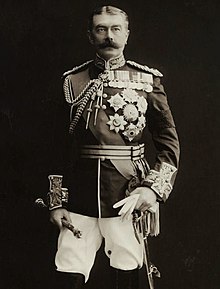
Back Herbert Kitchener Afrikaans هربرت كتشنر Arabic هربرت كتشنر ARZ Herbert Kitçener Azerbaijani Гарацыа Герберт Кітчэнер Byelorussian Хърбърт Китчънър Bulgarian Horatio Herbert Kitchener Catalan Horatio Kitchener Czech Herbert Kitchener, Iarll 1af Kitchener Welsh Horatio Kitchener Danish
The Earl Kitchener | |
|---|---|
 Kitchener in full dress uniform (July 1910) | |
| Secretary of State for War | |
| In office 5 August 1914 – 5 June 1916 | |
| Monarch | George V |
| Prime Minister | H. H. Asquith |
| Preceded by | H. H. Asquith |
| Succeeded by | David Lloyd George |
| Consul-General in Egypt | |
| In office 12 July 1911 – 5 August 1914 | |
| Preceded by | Sir Eldon Gorst |
| Succeeded by | Sir Milne Cheetham |
| Member of the House of Lords Lord Temporal | |
| In office 1 November 1898 – 5 June 1916 Hereditary peerage | |
| Preceded by | Peerage created |
| Succeeded by | Henry Kitchener, 2nd Earl Kitchener |
| Governor of Sudan | |
| In office 2 September 1898 – 22 December 1899 | |
| Preceded by | Abdallahi ibn Muhammad (Mahdist State) |
| Succeeded by | Reginald Wingate (Anglo-Egyptian Sudan) |
| Personal details | |
| Born | 24 June 1850 Ballylongford, County Kerry, Ireland |
| Died | 5 June 1916 (aged 65) HMS Hampshire, west of Orkney, Scotland |
| Cause of death | Killed in action |
| Relations | Henry Kitchener, 2nd Earl Kitchener (brother) Sir Walter Kitchener (brother) |
| Signature | |
| Military service | |
| Allegiance | United Kingdom |
| Branch/service | British Army |
| Years of service | 1871–1916 |
| Rank | Field marshal |
| Commands | Commander-in-Chief, India (1902–1909) British Forces in South Africa (1900–1902) Egyptian Army (1892–1899) |
| Battles/wars | Franco-Prussian War Mahdist War Second Boer War First World War |
| Awards | Complete list |
Field Marshal Horatio Herbert Kitchener, 1st Earl Kitchener (/ˈkɪtʃɪnər/; 24 June 1850 – 5 June 1916) was a British Army officer and colonial administrator. Kitchener came to prominence for his imperial campaigns, his involvement in the Second Boer War,[1][2] and his central role in the early part of the First World War.
Kitchener was credited in 1898 for having won the Battle of Omdurman and securing control of the Sudan, for which he was made Baron Kitchener of Khartoum. As Chief of Staff (1900–1902) in the Second Boer War[3] he played a key role in Lord Roberts' conquest of the Boer Republics, then succeeded Roberts as commander-in-chief – by which time Boer forces had taken to guerrilla fighting and British forces imprisoned Boer and African civilians in concentration camps. His term as Commander-in-Chief (1902–1909) of the Army in India saw him quarrel with another eminent proconsul, the Viceroy Lord Curzon, who eventually resigned. Kitchener then returned to Egypt as British Agent and Consul-General (de facto administrator).
In 1914, at the start of the First World War, Kitchener became Secretary of State for War, a Cabinet Minister. One of the few to foresee a long war, lasting for at least three years, and also having the authority to act effectively on that perception, he organised the largest volunteer army that Britain had seen, and oversaw a significant expansion of materiel production to fight on the Western Front. Despite having warned of the difficulty of provisioning for a long war, he was blamed for the shortage of shells in the spring of 1915 – one of the events leading to the formation of a coalition government – and stripped of his control over munitions and strategy.
On 5 June 1916, Kitchener was making his way to Russia on HMS Hampshire to attend negotiations with Tsar Nicholas II when in bad weather the ship struck a German mine 1.5 miles (2.4 km) west of Orkney, Scotland, and sank. Kitchener was among 737 who died; he was the highest-ranking British officer to die in action in the entire war.
- ^ Pakenham 1979, pp. 51, 573.
- ^ "BBC – History – The Boer Wars". BBC.
- ^ (Kidd 1903, p. 528)
© MMXXIII Rich X Search. We shall prevail. All rights reserved. Rich X Search